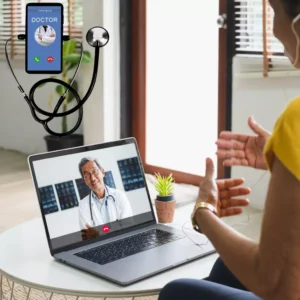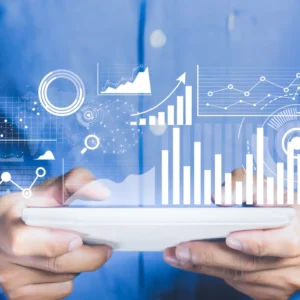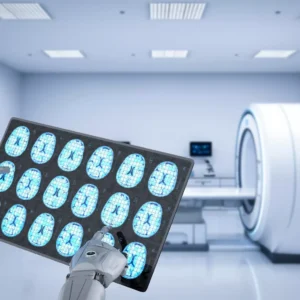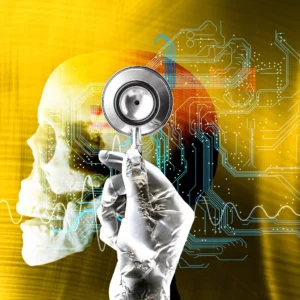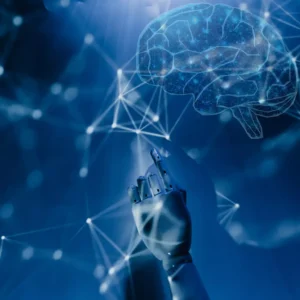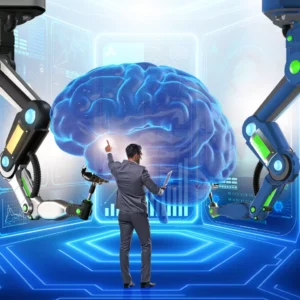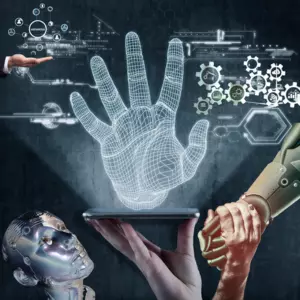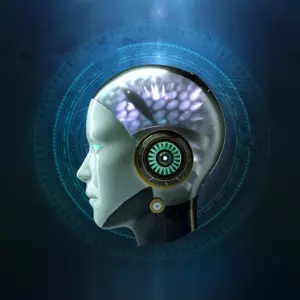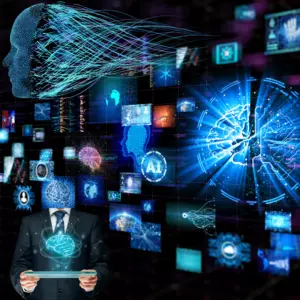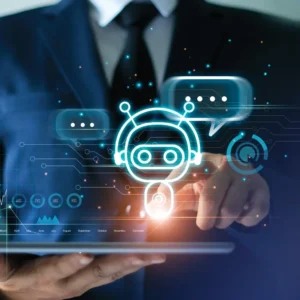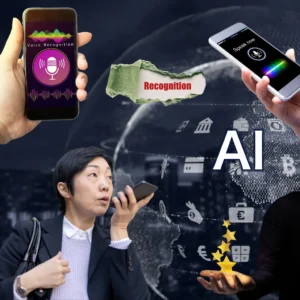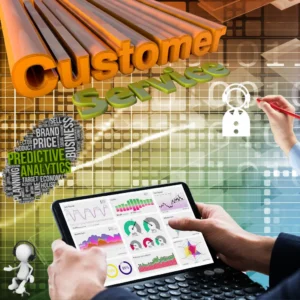
Digital Health Platforms
The Power of AI Integration
In today’s rapidly evolving healthcare landscape, combining Artificial Intelligence (AI) with digital healthcare platforms creates transformative changes.
This blend reshapes how healthcare providers interact with patients, redefines patient experiences, offers tailored health insights, and makes predictions more precise.
As we venture deeper into the age of digital health, it becomes crucial to understand the myriad ways AI influences patient portals, electronic health records, and the overall approach to healthcare data analysis. But, like all powerful innovations, this amalgamation presents ethical dilemmas and economic nuances.
Through this article, we’ll embark on a comprehensive journey, dissecting AI’s rise, challenges, successes, and promising future in digital healthcare platforms. Dive in and discover what tomorrow’s healthcare looks like today.
Table of Contents

Arindam Roy
An Automation Consultant with 25+ years of IT Experience
The Digital Health Landscape
The global health domain is experiencing an unprecedented metamorphosis, predominantly fueled by the rise of digital health platforms. These platforms are more than just electronic versions of manual systems. They’re sophisticated, adaptive, and increasingly intelligent tools designed to bridge gaps, enhance care, and facilitate a streamlined approach to health management.
When we sprinkle in some AI magic, things get even more exciting. Integrating AI in digital healthcare platforms has become the linchpin, driving transformative and innovative solutions in the sector. With AI’s capabilities, these platforms can predict, automate, and deliver insights with unparalleled accuracy, ensuring that healthcare becomes reactive and highly proactive.
Furthermore, the digital health landscape is no longer confined to hospitals or clinics. With personalized patient portals and real-time monitoring tools, healthcare has expanded its horizons, reaching patients in the comfort of their homes and even on the go. These advancements allow immediate feedback, timely interventions, and a more personalized patient care experience.
However, while the landscape is teeming with potential, challenges are aplenty. The vast amounts of data generated pose storage, security, and ethical concerns. Moreover, the lines between technology and personal touch may blur as AI-driven health platforms become more integrated into our daily lives.
What lies ahead for healthcare professionals and patients as these platforms become more advanced and AI-centric? Will they adapt swiftly or face the brunt of overwhelming tech? And more critically, where do we draw the line between machine-driven insights and human intuition in healthcare decisions?
Engaging Patients with AI
The journey towards superior healthcare is not just about cutting-edge technology; it’s about how that technology engages with its end-users – the patients. And in this journey, AI in digital healthcare platforms is proving to be a game-changer.
Imagine a healthcare realm where AI-powered platforms can send medication reminders, schedule timely doctor appointments based on patient behaviour, and even detect anomalies in health metrics to prevent potential health crises. This isn’t the distant future; it’s today’s reality. By leveraging AI-driven insights, patients are now equipped with proactive tools that anticipate and respond to their unique healthcare needs.
Moreover, with AI in patient engagement, there’s an added layer of personalization. These platforms can tailor recommendations, ensuring individuals receive advice and care that aligns with their health parameters and lifestyle. For instance, AI algorithms that analyze a patient’s data might highlight a tailored fitness routine or dietary suggestions based on genetic predisposition, past health records, and more.
But it’s not just about providing solutions; it’s also about building trust. The rise of personalized patient portals uses AI to facilitate meaningful conversations between patients and their healthcare providers. By interpreting complex health data into understandable insights, these portals act as a bridge, ensuring patients feel involved, informed, and in control of their health trajectories.
Yet, amidst this AI-driven engagement, a pertinent question arises: As these platforms increasingly mirror human-like interactions and understandings, will patients begin to view them as more than just tools? Will there be a day when AI becomes a go-to companion for many, offering solace, advice, and health insights akin to a trusted family doctor?
Personalization and Tailored Health Insights
In a world that thrives on customization, from personalized shopping experiences to tailored news feeds, healthcare benefits the most from such bespoke approaches. The heartbeat of this revolution lies in the marriage between personalization and AI in digital healthcare platforms.
After analyzing vast amounts of data, AI algorithms can identify patterns and provide customized insights for each patient. Gone are the days of one-size-fits-all prescriptions and health advisories. Instead, personalized patient portals powered by AI offer a window into the unique health ecosystem of each person.
What makes this even more fascinating is how it transcends mere data analysis. For instance, by evaluating genetic data, historical health records, lifestyle choices, and even real-time biometrics, AI can optimize health plans for each individual. Imagine a diabetic patient receiving meal suggestions, not just based on their diabetic status but also factoring in their activity levels, stress metrics, sleep patterns, and more.
Another critical aspect is predictive care. AI-driven platforms can not just react but can forecast. They can warn patients of potential health risks by analyzing data trends or recommend lifestyle changes before visible symptoms appear. This fusion of predictive analytics in healthcare platforms and personalization defines a new preventive and precise care paradigm.
However, this makes one ponder: With such deep levels of personalization, are we nearing a point where AI knows more about our health than we do? And how will this trove of insights redefine our relationship with our well-being?
Merging AI with Electronic Health Records
Electronic health records (EHR) are the cornerstone of patient data in the healthcare ecosystem. But while EHRs amass crucial patient information, they often need to be more utilized, representing mere digital repositories. This is where the prowess of AI in digital healthcare platforms plays a transformative role.
The intersection of AI and EHR is akin to a symphony, where every data point can lead to an orchestra of insights when analyzed with AI algorithms. By delving into the depths of patient records, AI can identify patterns, correlations, and trends that remain elusive to the human eye. It’s about detecting diseases earlier and pinpointing the best therapeutic pathways for patients.
Moreover, integration with electronic health records goes beyond diagnosis and treatment. For instance, AI can assist in administrative tasks by predicting which patients are more likely to miss appointments, thus streamlining operational efficiency. Or it could analyze patient feedback to provide valuable inputs for improving care delivery.
Yet another groundbreaking application is the marriage of predictive analytics in healthcare platforms with EHRs. AI can forecast potential health risks by analyzing past data and current metrics, allowing healthcare providers to intervene proactively. Combined with EHR, this predictive capability creates a robust, reactive, proactive system, ensuring optimal patient care.
But as the fusion between AI and EHR deepens, a thought-provoking question emerges: As AI continuously scours through patient data, deriving insights and making predictions, how do we ensure that this remains a tool in the hands of healthcare professionals and doesn’t overshadow their expertise? Where does the machine’s interpretation end and the doctor’s intuition begin?
Advancements in Healthcare Data Analytics
The modern healthcare sector is witnessing a data explosion. A deluge of information flows every moment, from patient records and genetic information to wearable device outputs. Yet, the advancements in healthcare data analytics, notably the application of AI in digital healthcare platforms, are bringing order to this chaos.
Traditional data analytics provided a reactive view, where patterns were observed after they manifested. Today, AI-driven platforms have revolutionized this space. They not only parse vast datasets faster but can also predict future designs. Imagine understanding a patient’s predisposition to certain diseases long before symptoms manifest. It’s a leap from reactive healthcare to proactive well-being.
Furthermore, with the rise of personalized patient portals, there’s a shift towards making analytics patient-centric. By blending AI algorithms with individual health profiles, there’s an emphasis on deriving insights tailored to each person. It’s a shift from generic health advisories to personalized health roadmaps, all thanks to advanced data analytics.
Integrating electronic health records is coupled with this, making data analytics more comprehensive. By converging historical data with real-time metrics, AI platforms can offer a 360-degree view of a patient’s health journey. It facilitates better decision-making, ensuring healthcare providers have all the requisite information at their fingertips.
As we marvel at these strides in healthcare analytics, a contemplative query lingers: In an era where data-driven insights are becoming the backbone of healthcare decisions, how do we ensure that the dazzle of technology doesn’t overshadow the human touch, the intuitive grasp, and the doctor-patient bond? How do we strike the perfect balance?
Ethical and Privacy Challenges
The possibilities constantly expand in the accelerating world of AI in digital healthcare platforms. Yet, as we navigate this frontier, ethical and privacy challenges emerge as the most formidable checkpoints on this journey.
Health data is deeply personal. As AI platforms delve into our medical histories, genetic data, and even day-to-day health metrics, there’s a lurking concern: Who truly owns this data? And more importantly, how do we ensure its sanctity? With the increasing sophistication of AI, ensuring data privacy isn’t just about securing servers; it’s about providing algorithms that are free from biases and upholding the highest ethical standards.
Further complicating this landscape are personalized patient portals. While they offer tailored insights and foster patient engagement, they also amass intimate details about individuals. This presents a dilemma. On the one hand, there’s the undeniable benefit of bespoke healthcare advice, but on the other, there’s the potential risk of data misuse or commercial exploitation.
Moreover, ethical considerations in digital health stretch beyond just data privacy. The intricate web of ensuring AI-driven diagnoses and treatments align with medical ethics. For instance, if an AI system recommends a specific treatment based on data analytics, how do healthcare professionals ensure that it aligns with the patient’s best interests and not just algorithmic efficiency?
Amidst these challenges, one underlying theme becomes clear: The need for robust ethical frameworks that guide AI implementations in healthcare. But this leads us to ponder: In an age where machines are making decisions that can directly impact human health, how do we craft ethical guidelines that are both technologically forward and deeply humane? Where does the fine line between technological advancement and moral responsibility lie?
Economic and Cost Implications
Integrating AI in digital healthcare platforms promises a new dawn for medical care, emphasizing efficiency, accuracy, and personalization. However, these technological marvels arrive with economic implications, casting ripples across the healthcare economy.
Initially, AI-driven platforms may seem expensive. The costs of developing, implementing, and maintaining sophisticated AI algorithms are significant. Institutions may grapple with the upfront investments required, especially when the immediate return on investment isn’t crystal clear. But there’s more to this economic tapestry than meets the eye.
Over time, the efficiencies introduced by AI can lead to tangible cost savings. Automated diagnostics, predictive analytics, and tailored treatment plans can reduce unnecessary tests, hospital readmissions, and ineffective treatments. The long-term savings can be monumental by pinpointing health issues earlier or even preventing them through predictive analytics in healthcare platforms. It’s not just about curbing expenses but also about enhancing the quality of care.
Another dimension to consider is the potential economic boon driven by innovations. As healthcare platforms evolve, they might spur job creation in tech-focused roles, fuel R&D investments, and even boost medical tourism as institutions leverage AI to offer cutting-edge care. The economic implications of AI platforms in healthcare are vast and varied.
Yet, amidst these promising horizons, there exists a pressing concern. As AI becomes a staple in healthcare, will it inadvertently widen the economic disparity between institutions that can afford these innovations and those that can’t? Will the future of healthcare be a tale of two worlds, with cutting-edge AI-driven care for some and traditional methods for others? How do we ensure that the economic benefits of AI in healthcare are equitable and accessible to all?
Preparing Healthcare Professionals
The dynamic dance of AI in digital healthcare platforms is reshaping the medical arena. However, as these systems grow increasingly integral, the stewards of patient care – the healthcare professionals – must be adequately equipped to harness their potential.
Medical curricula traditionally emphasize biological sciences, patient care principles, and clinical experience. But today, there’s an emergent need to introduce AI and data analytics modules. Not necessarily to make doctors data scientists but to ensure they can interpret and act on the insights AI platforms present.
This new educational paradigm isn’t just about knowledge. It’s about fostering adaptability. With AI systems evolving rapidly, continuous learning becomes essential. Workshops, certifications, and regular training sessions on the latest AI-driven patient engagement tools and techniques should become the norm.
Yet, it’s about more than just technical proficiency. Ethical considerations become paramount, especially when dealing with personalized patient portals and vast data sets. Healthcare professionals must be equipped to navigate the nuanced challenges posed by AI, ensuring they act in the best interests of their patients, both ethically and medically.
Furthermore, soft skills training gains precedence. As machines take on more diagnostic and analytical roles, the human touch becomes even more vital. Healthcare professionals must be adept at communicating complex AI-derived insights in an empathetic and understandable manner to patients.
As we march into this AI-augmented future, a reflective query emerges: In ensuring that healthcare professionals are prepared for this AI-driven era, how do we maintain the intrinsic human-centric essence of medical care? How do we balance cutting-edge technology and the timeless values of empathy, respect, and intuition?
Case study: Success in digital health
In the bustling city of Melbourne, Australia, a local hospital embarked on an ambitious journey to integrate AI into digital healthcare platforms, primarily focusing on patient engagement. Their goal? We aim to improve the patient experience by making it more seamless, efficient, and deeply personalized.
The hospital introduced an AI-driven app that interfaced with personalized patient portals, allowing patients to monitor their health metrics, schedule appointments, and communicate directly with healthcare professionals. However, the game-changer was the app’s predictive analytics feature. By analyzing a user’s health data, the app could proactively suggest check-ups, predict potential health issues, and recommend lifestyle changes based on genetic predispositions.
Within months, the hospital saw significant changes. Emergency room visits have been significantly reduced by proactively addressing potential health concerns. Patient satisfaction scores skyrocketed, with many praising the app’s intuitive design and the personal touch it added to their healthcare experience.
But the success was more than just patient-centric. Doctors and nurses found the integration with electronic health records particularly useful. With AI analyzing vast amounts of data, they received insights about patient health trends, enabling them to tailor treatments more effectively.
This Melbourne-based initiative paints a promising picture of how digital health, powered by AI, can revolutionize the healthcare sector. But as with all success stories, it begs an essential question: While this hospital reaped the benefits of AI integration, how can such success be scaled globally? And as other institutions look to replicate this model, what challenges might they face in different cultural or socio-economic contexts?
Future Predictions
As we gaze into the horizon, the role of AI in digital healthcare platforms promises to be transformative, heralding a new era of medical innovation and patient care. But what might this future landscape look like?
The line between wearable tech and medical devices will blur. Imagine smartwatches that track your heart rate and predict potential cardiovascular events. By melding AI-driven patient engagement tools with everyday wearables, individuals will become active participants in their health journey, curbing potential issues before they escalate.
In diagnostics, AI algorithms will work with human experts, scanning medical imagery with unparalleled precision. These algorithms will spot nuances and patterns that might elude the human eye, ensuring earlier and more accurate disease detection.
But beyond the clinical applications, a more holistic transformation awaits. Personalized patient portals powered by AI will become health and wellness hubs. Here, AI won’t just offer medical advice and curated wellness recommendations, ranging from dietary suggestions to mental health resources, all tailored to an individual’s genetic makeup, lifestyle, and preferences.
Yet, as we embrace these advancements, a crucial aspect will be the deepening synergy between AI and human healthcare professionals. While AI analyses, predicts and advises, the human touch interprets, empathizes, and connects. This combination will elevate healthcare to a technologically advanced yet deeply human realm.
The trajectory is clear – a future where healthcare is proactive, personalized, and profoundly effective. But as we navigate this brave new world, a contemplative thought emerges: In a domain dominated by AI-enhanced insights and interventions, how do we ensure that human values, ethics, and the essence of care remain at the heart of it all?
Conclusion
The dawn of AI in digital healthcare platforms has reshaped the very fabric of healthcare, ushering in a new era characterized by innovation, precision, and personalization. From the vibrant streets of Melbourne to the bustling corridors of global hospitals, the transformation is undeniable and profoundly impactful.
The rise of digital health platforms has blurred the boundaries between technology and medicine. These platforms have empowered individuals, making them active participants in their health journey. Wearable tech, once a novelty, now stands at the intersection of daily living and proactive healthcare, thanks to AI’s ability to analyze and predict.
In engaging patients, AI plays the dual role of a guide and a guardian. It harnesses predictive analytics in healthcare platforms, ensuring potential health concerns are addressed before they manifest. These personalized patient portals offer an intuitive and intimate healthcare experience.
Furthermore, merging AI with electronic health records has revolutionized diagnostics, making it more precise and timely. But this technological marvel comes with its set of challenges. Ethical considerations in digital health are paramount, especially when navigating the vast oceans of data. Patient privacy, data security, and ethical use are pillars upon which this AI-driven ecosystem must stand.
The economic implications of AI platforms are twofold. While initial investments might be substantial, the long-term cost savings in healthcare expenditure and improved patient outcomes promise a brighter, sustainable future.
Preparing healthcare professionals for this shift is crucial. They remain the vital bridge between AI’s analytical prowess and the empathetic, human-centric approach that is the essence of care. The balance between technology and touch becomes the centrepiece as we ponder the innovations and the way forward.
So, as we stand at this nexus of possibilities, the vision for the future is clear: A healthcare realm harmoniously integrating AI’s capabilities with the timeless values of empathy, care, and human intuition. The journey ahead is thrilling, filled with promise, potential, and an unwavering commitment to bettering human lives.
Related Articles
- AI in Telehealth: Revolutionizing Remote Care
- Navigating the Next: AI’s Role in Healthcare Predictive Analytics
- Transforming Medical Imaging with AI Capabilities in Radiology
- AI in Genetic Data Analysis: Personalizing Medicine
- AI in Diagnostics: A New Era of Precision and Accuracy
- Smart Hospitals: The Role of AI in hospital operations
- Mental Health Tech: AI-powered Mental Health Apps for Assessment and Therapy
- AI-Powered Drug Discovery: A Revolution in Pharma
- Medical Robots Enhanced by AI: Transforming Surgeries and Care
- Wearable Health Tech: AI-driven health wearables
- AI’s role in chronic disease management
- Neural Interfaces and AI: Bridging Minds and Machines
- Digital Health Platforms: The Power of AI Integration
- AI in Epidemiology: Predicting and Controlling Outbreaks
- AI in Rehabilitation: Personalized Recovery Pathways
- AI in Predictive and Preventive Care: A Proactive Approach
- AI in Home Healthcare: Personal Health Management
- Revolutionise Healthcare with IPA Tools: Streamlining Processes, Improving Efficiency, and Enhancing Patient Care
- Other Articles on AI Usage in Healthcare
- Other Articles on AI usage in different industries
Forbes Articles related to AI usage in Healthcare:

